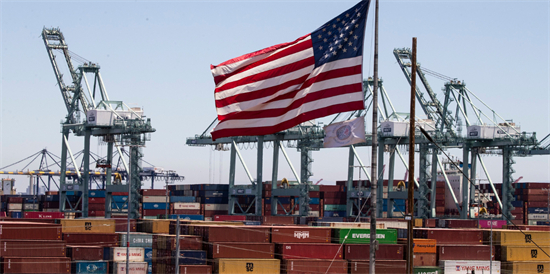In the News
ARRINGTON: Harris’s record on trade paints a dire picture for American producers, consumers
Washington,
October 17, 2024
Tags:
Economy
Harris’s record on trade paints a dire picture for American producers, consumers10/17/24 AS SEEN IN THE HILL Vice President Kamala Harris has no shortage of ruinous economic policy positions. Her commitment to raising taxes, enacting Venezuelan-style price controls, and further shackling America’s energy production would be disastrous for American working families. And although Harris doesn’t have an extensive record on trade, the limited evidence at hand paints a dire picture for the future of American producers. Enacting an active and aggressive trade agenda is key to ensuring fair and open markets for American food, fuel and fiber. With the rest of the world generally maintaining higher trade barriers than the United States, it is important to enhance export opportunities for farmers, ranchers and manufacturers by pursuing fair trade deals that bring real market access. With bad actors like China using highly subsidized state-owned entities to undercut American businesses, it is critical to hold trading partners accountable for distortive practices. Over the last four years, the Biden-Harris administration has embraced ineffective trade strategies, and Vice President Harris has been silent on what she would do to help American exporters if elected. This isn’t surprising given her campaign strategy is to promote something as insubstantial as “joy” instead of delivering concrete policy proposals. Nevertheless, she owes the American people an explanation. Will she pursue real, binding trade deals, or should Americans expect more of the same? The only time Harris took a major trade vote during her time in Congress was in 2019, when she voted against the U.S.-Mexico-Canada Agreement (USMCA). USMCA replaced the North American Free Trade Agreement, expanding market access for U.S. exports into Canada and Mexico, incentivizing auto companies to bring production and jobs back to the United States, and setting gold-standard rules for trade over the internet. USMCA modernized our trading relationship with Canada and Mexico by leveling the playing field for workers and provided a much-needed framework for how the U.S. can settle disputes with these allies. Yet Harris voted “no.” And in doing so, she made her preference clear: She prefers NAFTA — the outdated deal that Republicans and Democrats alike have criticized for years, and which Trump was successful in replacing with USMCA. Her opposition came despite USMCA passing with overwhelming bipartisan support. For example, both then-Speaker Nancy Pelosi (D-Calif.) and the AFL-CIO joined Republicans in backing and passing USMCA. Harris is now misleading the American public by stating that she opposed USMCA because it didn’t go far enough in strengthening automotive rules. But in 2019, when she took the vote, her press release contained zero mention of the American auto industry. Rather, it was directed only at appeasing “environmental and conservation leaders,” stating “by not addressing climate change, the USMCA fails to meet the crises of this moment.” As vice president, Harris has been in lockstep with President Biden’s surrender approach to trade. Under the Biden-Harris administration, the U.S. has suffered its highest agricultural trade deficit ever — $30.5 billion over the past year, projected to increase again in fiscal 2025, to $42.5 billion. For context, the U.S. did not have a single agricultural trade deficit from 1960 to 2018 and averaged an annual surplus of $5.8 billion under the Trump administration. This deficit is a direct result of the Biden-Harris administration’s refusal to negotiate trade agreements that would increase market demand for our agricultural exporters at a time when American farmers and ranchers are facing low commodity prices and high input costs spurred by the Biden-Harris inflationary firestorm. Agricultural exporters have also been hurt by the Biden-Harris administration’s refusal to enforce existing trade agreements. Although President Trump negotiated an agreement with China to purchase additional U.S. agricultural exports worth billions of dollars, Biden and Harris refused to enforce this agreement. As a result, China purchased only about half of what it had committed to. Biden’s White House was also late to the game in launching a USMCA dispute against a Mexican ban on American exports of genetically modified white corn. Now there is a realistic chance that this law could be enshrined in Mexico’s constitution. It’s one thing to refuse to seek new trade deals and fail to enforce existing agreements, but it’s another to actively work against the competitiveness of American exporters. That is exactly what Biden and Harris did when cancelling the approval of LNG export applications this past January to appease climate activists. This is an inexcusable policy, as it threatens America’s energy independence and the national security of some of our closest allies. If elected president, Harris will continue Biden’s anti-U.S. export approach to trade and take positions far more liberal than those of other progressive Democrats. She will oppose trade agreements that would clearly advance U.S. interests and enjoy broad bipartisan support. That’s a lose-lose for American producers and consumers, who deserve a president that looks out for their best interests. Jodey Arrington represents the 19th District of Texas and serves as chairman of the House Budget Committee. He also serves on the Trade and Tax Subcommittees of the House Ways and Means Committee. |



